Psychedelic Advisory Board Holds First Meeting on Colorado Natural Medicine Health Act
The fifteen-member psychedelic board met yesterday to approve bylaws, form subcommittees, discuss ethics, select a chair, and schedule future meetings
The Natural Medicine Advisory Board (the “Board”) held its first meeting yesterday between 1pm and 5pm Mountain Time.
Governor Jared Polis appointed members to the fifteen-person Board in January, as required by the Natural Medicine Health Act (NMHA). Voters approved the NMHA in November as Proposition 122.
In the coming years, the Board will make recommendations to the Department of Regulatory Agencies (DORA) on implementing the NMHA. However, the group faces a rapidly approaching deadline. It must deliver a comprehensive set of recommendations to DORA by September 30, 2023.
Fortunately, the Board got down to business quickly. The agenda for yesterday’s meeting can be found here. Denver photojournalist Jacob Curtis posted video of the event on YouTube (in parts one, two, and three).
Much of the Board’s activity yesterday was foundational, setting the stage for future meetings. I’ll summarize the four-hour event before delving more deeply into its most interesting moments.
Karen McGovern, Interim Director of DORA’s Division of Professions and Occupations, opened yesterday’s meeting. McGovern was joined by Sam Bahrami, DORA’s Program Director and Senior Advisor for Natural Medicine Services, Ashley Moller, First Assistant Attorney General for the State of Colorado, and Brian Urankar, an Assistant Attorney General with the Colorado Attorney General's Office.
Bahrami provided an overview of DORA and its role in administrative rulemaking. McGovern then addressed Board members regarding their ethical responsibilities. Later, the Board established six subcommittees, discussed when to hold future meetings, approved bylaws to govern its activities, conferred with legal counsel during a closed-door executive session, selected a Chair of the Board, and attested that all members’ conflicts of interest had been disclosed.
Here are some of the meeting’s standout moments.
Board Member Ethics
McGovern asked members not to discuss board-related business with stakeholders in the psychedelic industry. If you do, “you may be creating a conflict of interest for yourself. When it comes time to discuss the matter at the meeting, you may be forced to be recused from the matter because you’ve created a conflict.”
McGovern showed a slide, which stated, “board members should only be communicating with the Program Director [Bahrami] or staff about board business.” It specified that “communication includes oral communication, emails, texts, instant messaging, etc.”
This part of the presentation was interesting because it clarified that Board members should discuss board-related business with no one, unless specifically authorized. According to McGovern, the Board speaks only as a single unit unless it nominates someone to speak on its behalf for a specific purpose. If the board doesn’t nominate anyone to speak on a certain issue, “then it doesn’t happen,” said McGovern.
DORA’s policy on Board member communication with industry stakeholders differs from that of the Oregon Health Authority (OHA) during its implementation of Measure 109, the Oregon Psilocybin Services Act. The Governor’s Office and the OHA had no problems with members discussing board business with industry stakeholders, including lobbyists with the Healing Advocacy Fund.
During one Oregon meeting, board member Kimberley Golletz expressed concern that the Fund was contacting board members to coordinate votes between meetings. OHA officials stated that communicating with the Fund and other industry stakeholders was not strictly forbidden. However, in Colorado, such communications are clearly against the rules.
Whether Board members will comply with these rules remains to be scene. But according to McGovern, Board members should decline private conversations with the public, the Healing Advocacy Fund, and other industry stakeholders.
Forming Subcommittees
One of the Board’s most lively discussions addressed the formation of subcommittees, to which much of the Board’s work will be delegated.
During the implementation of Measure 109, the Oregon Psilocybin Advisory Board created five subcommittees. They focused on health equity, research, training, licensing, and products. Board members proposed these subcommittees during their first few meetings.
With little time to spare, Colorado’s board formed six subcommittees by the third hour of its first meeting. DORA Executive Director Patty Salazar had approved these subcommittees for the group’s consideration with input from McGovern and Bahrami. They included the following committees:
Public Health and Health Equity
Indigenous and Religious Use
Harm Reduction and Public Safety
Products, Research, and Data
Emergency Response, Safety, and Ethics
Qualifications, Licensing, and Training
DORA provided a slide with details regarding each proposed subcommittee.
Before the Board approved these committees, member Billy Wynne offered an alternative proposal. Specifically, Wynne argued against forming a subcommittee focused on Indigenous and religious use. Instead, he advised implementing a “cross cutting equity directive,” which would apply to all subcommittees. He proposed five subcommittees in lieu of the six recommended by Director Salazar. They included the following:
Services Subcommittee
Medicine Subcommittee
Healing Center Subcommittee
Access Subcommittee
Data Subcommittee
Wynne, a resident of Greenwood Village, Colorado, represents the fields of health insurance, health policy, and harm reduction. According to his professional website, he has significant experience working in Washington, DC healthcare policy. In 2018, he founded the Wynne Health Group, a government and public relations firm.
In response to Wynne’s proposal, McGovern said: “In looking at the subcommittees that we’ve put together for the Director, I think those are the areas for which the Director needs the information to make the rules.” She [the Director] said there are certain things that need to be there. “Harm reduction is one,” advised McGovern. “Then, I think having that subcommittee that just focuses on Indigenous and religious use is really important given the climate and given the origin of these medicines. I think it’s incredibly important that we honor that use.”
Board member Johsua Goodwin expressed concern that spreading responsibility for considering Indigenous perspectives across all subcommittees could overburden Board members with relevant expertise. “I’m not an expert on the Indigenous use of this,” said Goodwin. “So, I don’t know how many people we have on the Board that fit that criterion. Do they even have time to sit on that many different committees versus sitting on one, where they kind of look at each policy and screen [it] and say, ‘does this kind of fit what we need?’”
Goodwin, a resident of Aurora, Colorado, represents military veterans on the Board. According to his LinkedIn profile, he is a retired Air Force Office of Special Investigations counterespionage case officer and special agent. He is currently CEO of Operation True North Colorado, a mental health company designed for veterans, first responders, and their families.
Board member Sofia Chavez said she appreciated the thought of adding an Indigenous perspective to all subcommittees. Chavez explained the importance of considering Indigenous knowledge in the context of mushroom cultivation and psilocybin administration. “As an individual, I’m going to want to purchase plants, or have access to plants, that were produced in an Indigenous, holistic religious way,” said Chavez. “So, I think it [Indigenous knowledge] touches on a lot of these different subcommittees, and we have to be aware of that moving forward,” she added.
Chavez occupies a Board seat that represents the Indigenous and religious use of psychedelics. She is a board-certified Doctor of Natural Medicine. Her presence is notable because during the implementation of Measure 109, the Oregon Health Authority struggled to fill a seat focused on Indigenous use, and Indigenous perspectives were largely overlooked by the agency and its Board.
Colorado Board member Lundy recommended a “both and approach,” incorporating Indigenous perspectives in all aspects of the Board’s work while forming a subcommittee devoted to this topic. “I do think that equity needs to be considered in every subcommittee,” said Lundy. “That being said, I think it’s essential to have a subcommittee where that is a primary consideration because otherwise, I have concerns that it won’t be considered.”
Lundy occupies a seat focused on behavioral health and disparities in access to healthcare services. In their Board application, Lundy wrote, “I am uniquely qualified and passionate about health equity within the natural medicine sector in light of my intersections as a non-binary and queer person, mental health and natural medicine entrepreneur, licensed professional counselor, and someone with lived mental health experience personally transformed by natural medicines.”
Ultimately, the Board voted to create the six subcommittees proposed by McGovern and Director Salazar, including a committee focused on Indigenous and religious use. The group then considered subcommittee assignments for each Board member.
DORA officials had pre-assigned Board members to subcommittees based on their areas of experts. However, they also invited members to request changes to these assignments.
Scheduling Future Meetings
Next, the Board briefly discussed the scheduling of future meetings. After debating various schedules, they decided to circulate a Doodle poll to find the most convenient times for all members. Regardless of which dates are ultimately chosen, the full Board will meet once per month, and subcommittee will convene twice monthly.
Approving the Bylaws
The Board next adopted bylaws to govern its activities. DORA provided a set of proposed bylaws to members prior to yesterday’s meeting. The group adopted them largely as proposed, following a relatively unremarkable amendment regarding subcommittee composition.
Selecting a Board Chair
One of the strangest aspects of the meeting was the appointment of a Board Chair, which happened so quickly and unceremoniously, it could have easily been missed. With virtually no discussion, and seemingly no vote, the group declared Katina Banks as Chair and Goodwin Vice Chair.
Banks is an attorney and Denver resident. She occupies a Board seat focused on the “criteria for approving permitted organizations,” in other words, licensure. In 2018, Banks joined the intellectual property team of Denver law firm Baker Hostettler. Her professional profile says she has over seventeen years of legal experience with expertise in copyright, trademark, and advertising law. She serves on the advisory council of the Mathew Shepard Foundation, a civil rights organization.
In her application for Board membership, Banks wrote, “[t]hroughout my professional legal career I have believed in giving back to my community and enjoy volunteer service for the greater good.” She also noted, “I have significant civic board/commission experience to help advance the important public work of these special administrative bodies.”
Without a doubt, Banks’ appointment as Chair was odd, at least procedurally. But given her legal and public service experience, it’s difficult to think of a more qualified candidate.
Moving into Executive Session
As the newly appointed Chair, Banks requested a motion to enter a closed-door executive session. During this session, the Board would ask questions of lawyers from the Colorado Attorney General’s Office (Moller, and possibly Urankar).
Before entering the session, Banks read a list of questions submitted by Board members earlier in the meeting. Many focused on ethical issues such as communication by Board members outside public meetings.
Board member Sue Sisley asked a question about an upcoming psychedelic conference, Psychedelic Science 2023. A physician, well known for her controlled substances research, Sisley is the only Board member from out of state. A resident of Scottsdale, Arizona, she fills a seat reserved for someone having expertise in mycology and natural medicine cultivation.
“There’s a psychedelics conference in Denver,” said Sisley, “and I know many of us are scheduled to speak at that event, which means we’ll be together. There is a chance we’ll be interacting. Of course, I hope we would all abstain from talking about Board matters.” Sisley asked whether board member should formally announce that they’ll be congregating at this meeting, “as an added layer of protection so people can be aware of that.”
Board member Alisa Hannum asked a question about members of the public applying to serve on subcommittees and their potential relationships with Board members. On the Board, Hannum represents mental and behavioral health providers and issues confronting veterans. According to her professional profile at the EMDR Training Academy, Hannum is a clinical psychologist in the VA Eastern Colorado Healthcare System.
Because the Board discussed Sisley and Hannum’s questions behind closed doors, the public was not provided with the answers. Perhaps Moller can address these questions publicly in future meetings.
Attesting to Disclosure of All Conflicts of Interest
In the final moments, Banks asked each Board member the following question: “Do you attest and affirm that all conflicts of interest have been disclosed and that confidentiality of all board matters has been maintained since the previous board meeting?”
All Board members attested to having disclosed all conflicts. Strangely though, it is unclear if and when they disclosed those conflicts publicly. None were discussed during this meeting, potentially leaving the public uninformed.
With that, Banks called for a motion to adjourn, and the Natural Medicine Advisory Board’s first meeting came to a close. Stay tuned for more coverage of the Board’s activities from Psychedelic Week.
*The views expressed on Psychedelic Week do not represent the views of Harvard University, POPLAR at the Petrie-Flom Center at Harvard Law School, Florida State University, or the Florida State University College of Law. Psychedelic Week is an independent project unaffiliated with these programs and institutions.
Mason Marks, MD, JD is the Florida Bar Health Law Section Professor at the Florida State University College of Law. He is the senior fellow and project lead of the Project on Psychedelics Law and Regulation (POPLAR) at the Petrie-Flom Center at Harvard Law School and an affiliated fellow at the Information Society Project at Yale Law School. Marks teaches drug law, psychedelic law, constitutional law, and administrative law. Before moving to Florida, he served on the Oregon Psilocybin Advisory Board where he chaired its Licensing Subcommittee. Marks has drafted drug policies for state and local lawmakers. His forthcoming book on psychedelic law and politics will be published by Yale University Press. He tweets at @MasonMarksMD and @PsychedelicWeek.


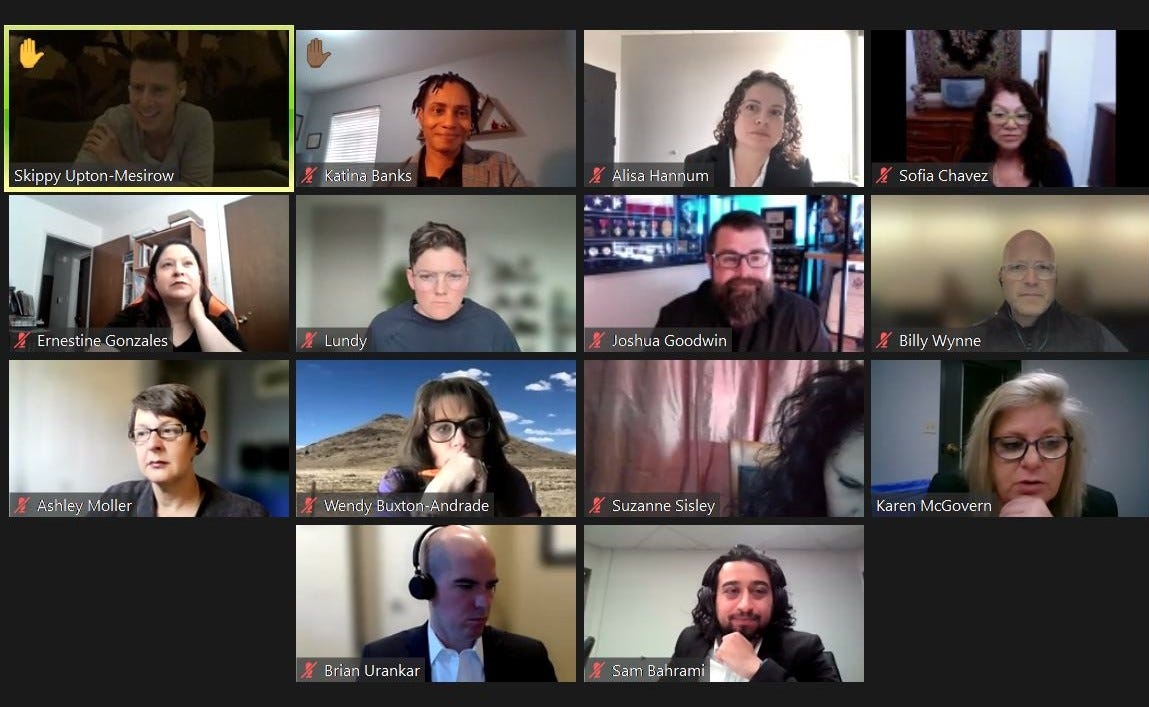
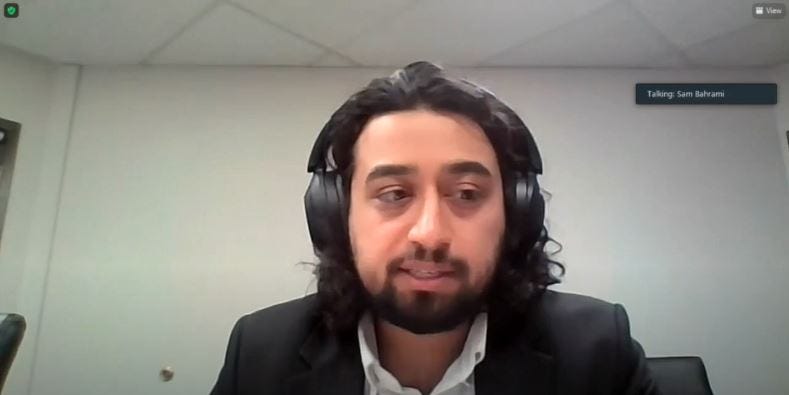
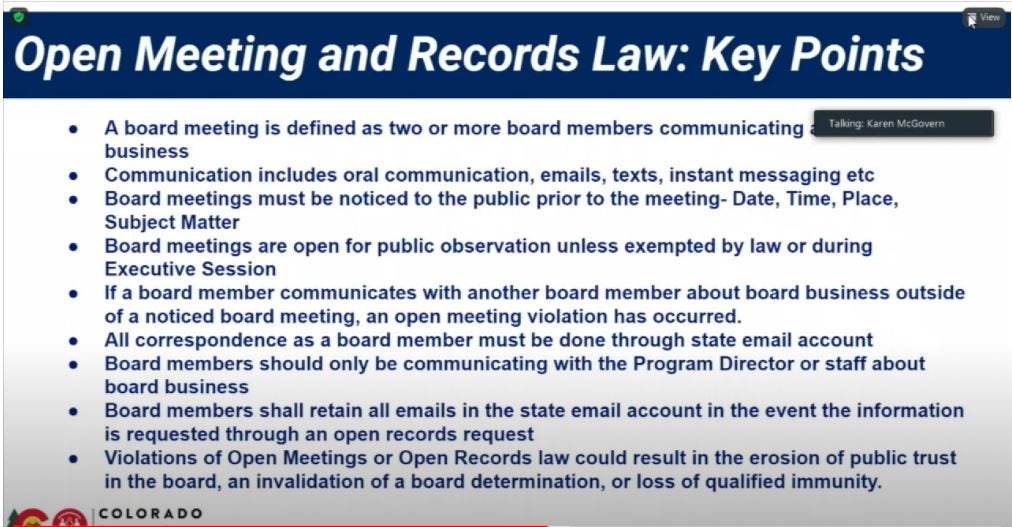
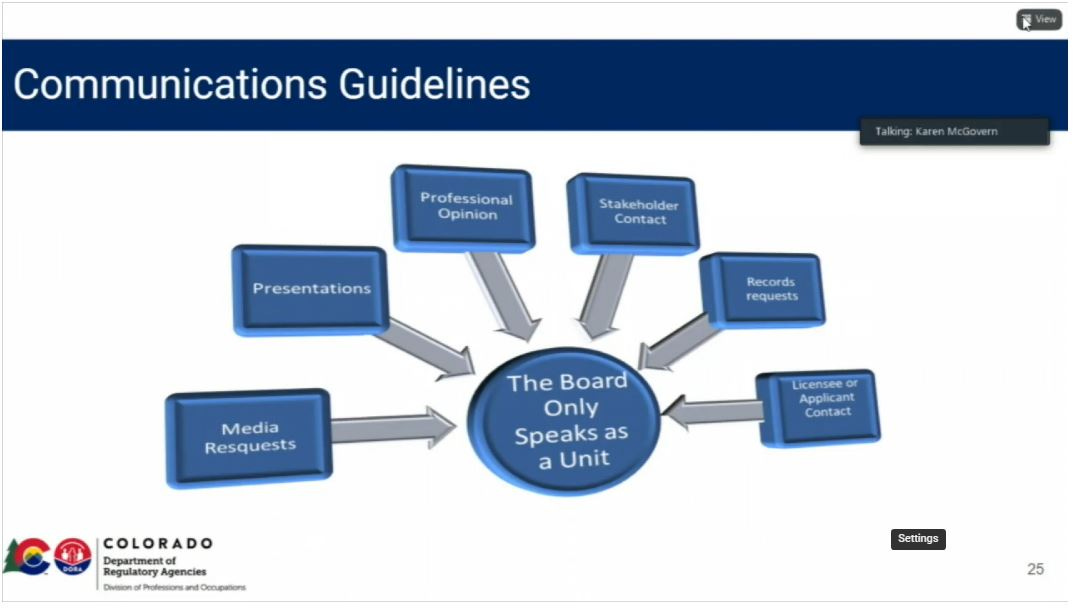
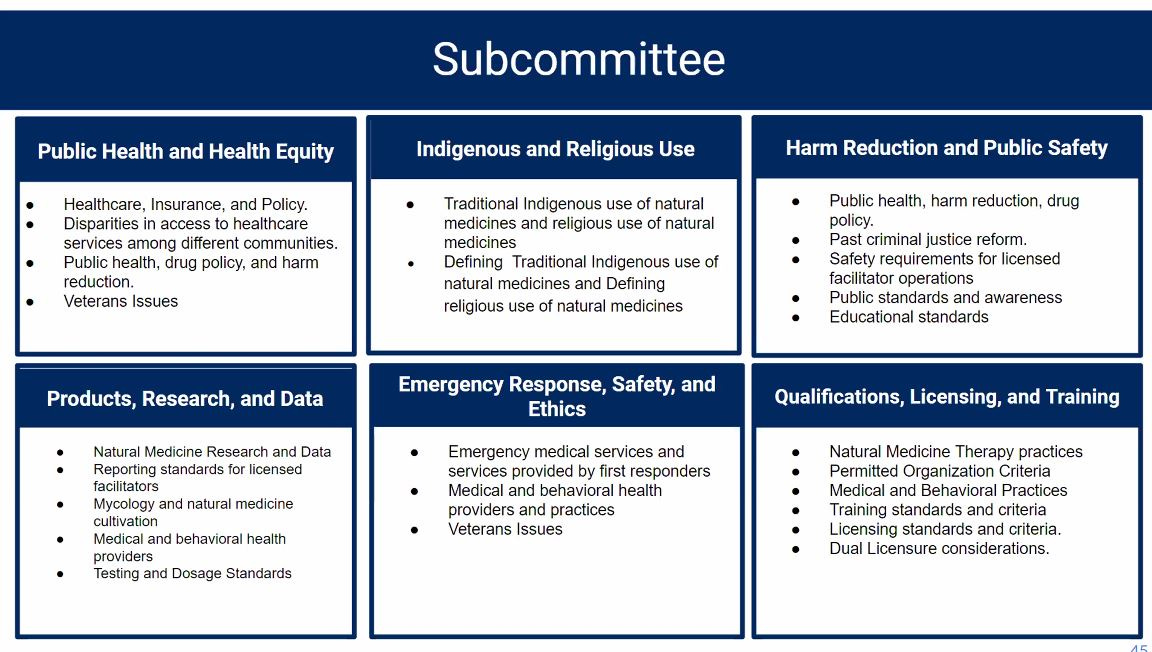
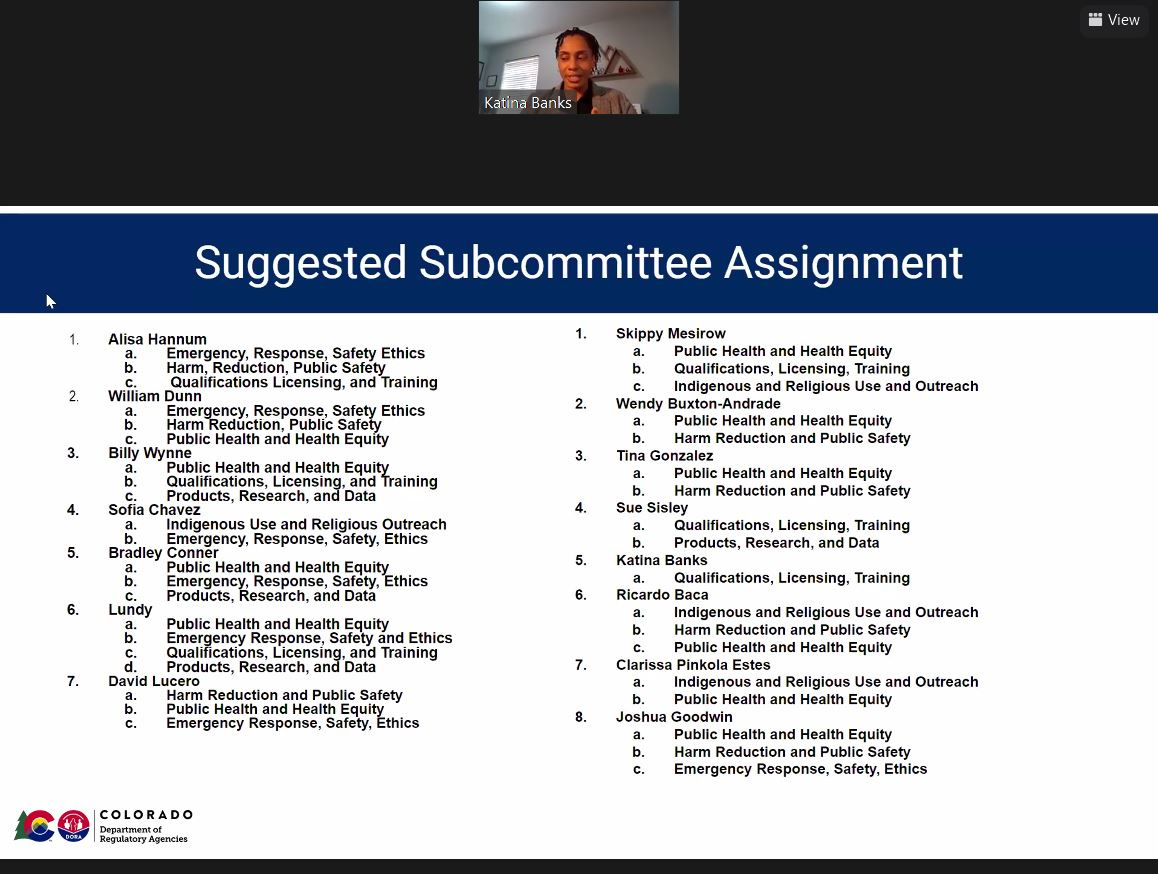
Great summary! 🙌 It was definitely interesting to attend.
Do board and DORA team members all meet Colorado residents requirements?